HORNS blare and tyres screech in a screaming tangle of weaving cars and near misses on Ayala Avenue in the Philippines capital of Manila.
Three skinny, wild-eyed youngsters are perched precariously on the back running board of an overflowing purple “Jeepney’’ bus as it scoots through the traffic, their matted hair billowing in the breeze as the gaudy vehicle, festooned with ribbons and flowers, races along at breakneck speed. The Jeepney screeches to a temporary halt as the traffic stalls. The children, jolted by the sudden stop, struggle to stay upright but then leap off the bus and run to the windows of paused cars, tapping frantically on the windshields, begging for money and food, desperation in their sad faces. Every day hungry, homeless children risk their lives begging amid the chaotic traffic on the busy road outside the five-star Shangri-La Hotel.
Once Manny Pacquiao, the multi-millionaire boxer and Philippines senator, lived among these lost children on the edge of oblivion; dirty, despondent and bedraggled, a thousand miles from home and a million miles from hope. He had stowed away on a boat to make a life for himself in the big city, escaping from a background so dysfunctional that Pacquiao’s father once killed and cooked a lost puppy Pacquiao had befriended.
Pacquiao was once just another barefoot kid trying to survive on Manila’s mean streets but Forbes magazine estimates that in the past 20 years he has earned more than $A660 million from boxing. On July 2 he will make another $A10 million or more as he defends his World Boxing Organisation welterweight (66kg) title against Brisbane’s “Fighting Schoolteacher’’ Jeff Horn at Suncorp Stadium.
The bout will be the biggest boxing match staged in Australia, with more than 40,000 tickets already sold and predictions that 55,000 fans will fill the stadium and almost a billion people will watch the telecast in 159 countries.
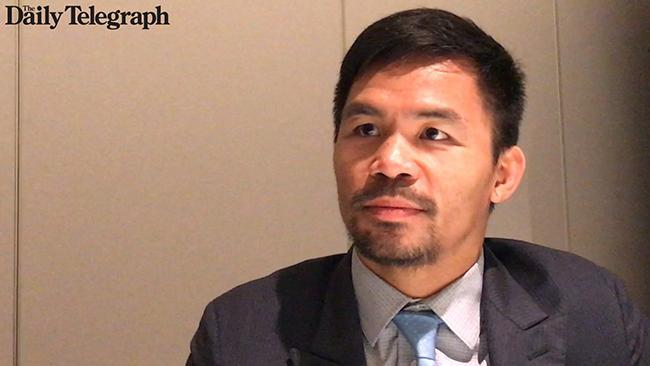
Pacquiao is taking no chances with his life in the lead-up. As children dart through the busy traffic, he arrives at the Shangri-La in an armoured car for dinner with a dozen Australian journalists. The windscreen of his vehicle is thick as glass bricks and on the front passenger seat beside the driver is a Turkish-made 9mm pistol.
Guns abound in Manila, with armed guards in almost every shop. Two weeks after Pacquiao hosts the media dinner, at least 36 people are killed 6km away as a gunman attacks the Resorts World Manila casino.
Pacquiao is cautious wherever he travels. He is one of the richest men in his country and a key supporter of controversial President Rodrigo Duterte and his war on drug pushers that has resulted in an estimated 7000 people being gunned down. Pacquiao has been involved in other storms, too. Last year, the born-again Christian declared that homosexuals were “worse than animals’’ and, despite his subsequent apology, Pacquiao lost a long-term multimillion-dollar sponsorship with sports company Nike.
“I’m sorry for hurting people by comparing homosexuals to animals,” he said, trying to quell the uproar at the time. “Please forgive me for those I’ve hurt. I still stand on my belief that I’m against same-sex marriage because of what the Bible says, but I’m not condemning LGBT. I love you all with the love of the Lord. God bless you all.’’
Last year government agents foiled a plot to kidnap him by the terrorist group Abu Sayyaf, an organisation blamed for the beheading last year of two Canadian hostages.
Pacquiao looks relaxed, even a little bashful, as he saunters into the Shangri-La’s Japanese restaurant with a bodyguard and two friends. He is dressed casually in jeans and jacket and slips into the seat next to mine. He eats here several times a week and will pick up tonight’s $A5400 restaurant tab with not so much a blink of his eye as a nod to his bodyguard to take care of the bill. His driver tells me later that Pacquiao has more than 100 people maintaining his four mansions in the Philippines and sometimes, when he treats different groups of them to a night out, the bill can hit $30,000. He’s not too concerned about money. Even when he lost a fight against Floyd Mayweather in 2015 in Las Vegas he made what Forbes estimates was more than $A160 million.
Three years ago he left a $780,000 watch in a hotel room, getting it back after offering a reward of $170,000. In 2015 he paid rapper Sean Combs $A17 million for his home in Beverly Hills, where he keeps a fleet of luxury cars including a Ferrari 488 Italia. He also has a 25,000ha cattle ranch in Idaho. Yet this very rich man remains a child at heart.
Over dinner of sea cucumber, tempura prawns and other delicacies, he laughs uproariously, often. He chuckles at the thought of fighting UFC loudmouth Conor McGregor and finds Australian accents hilarious, mimicking the voices around him with a “G’day mate” or “How’s it goin’ mate”.
At one stage, the 38-year-old, who was born in a thatched hut in a jungle and speaks to Australian reporters in broken English, suddenly morphs into Mel Gibson portraying the Scottish folk hero from the movie Braveheart.
“Ma name is William Wallace,’’ Pacquiao says, sounding very much like Sean Connery. “They can take away our lives but they will never take our freedom.’’ He giggles and it is impossible not to be infected with his good humour.
Pacquiao has three phones with him, one for his work as a senator, one for boxing contacts and one for his wife and five children to call. It’s the only phone he answers at the dinner table and the one he uses to show me the “Real Boxing Manny Pacquiao’’ Android app in which he beats up challengers from around the world.
I’d just spent three days watching Pacquiao train for the Horn fight and all along he seemed to be taking things easy, punching in rapid-fire bursts only occasionally and spending much of his gym time signing autographs, posing for pictures or chatting with friends. I ask him if he’s underestimating the Brisbane boxer, who despite being unbeaten in 17 professional fights is a rank outsider against one of the all-time greats. For a while Pacquiao doesn’t answer. He’s concentrating on his phone as his thumbs work his boxing game with machine gun speed. On the face of the phone, the head of Pacquiao’s opponent is being knocked in all directions.
“I win,’’ he says finally, with the look of a small boy delighted at a new toy. His expression then gets serious. “No, I never underestimate anyone. This is Jeff Horn’s big chance. I remember when I was starting out, I would lie awake at night and dream of winning a big fight. I will be 100 per cent ready.’’
Then Pacquiao closes his soft, brown eyes for a moment and reminds me of a time when his fame and fortune were the fantasies of a poor boy who had nothing in life to treasure but a puppy. “I fight to inspire poor people everywhere,’’ he says, “to give poor people hope. They know the life I come from. They know if they try hard anything is possible.’’
Then he laughs loudly again and reprises the role of William Wallace. “I can speak Scotland (sic),’’ he says proudly. Call me Braveheart.’’
Bob Arum is an 85-year-old Harvard-trained lawyer who began promoting fights for Muhammad Ali in 1966 and became the most successful boxing entrepreneur of all time, outlasting his great electric-haired rival Don King while showcasing the likes of Joe Frazier, Sugar Ray Leonard, Marvin Hagler, Thomas Hearns, Roberto Duran and, more recently, Manny Pacquiao. Arum says there has never been a boxer like the Filipino whirlwind, whose frenetic all-action style, sizzling hand speed and savage power has made him a global phenomenon.
“Manny has won 11 world titles across eight weight divisions from flyweight (51kg) to junior-middleweight (70kg),’’ Arum tells me in Melbourne during Pacquiao’s promotional tour to Australia in April. “No one in boxing history has come close to what Manny has done. But the truly great things he does are not in the boxing ring but for the poor people of the Philippines. There is a lot of poverty there and people often ask me if they have a welfare system in that country. I say ‘Yes, they do, and the welfare system is called Manny Pacquiao’. He has given millions to his people.’’
Last year Pacquiao announced that out of his own pocket he had paid for 1000 homes to be built for the poor in General Santos City, where he was raised. “I will never forget where I came from,’’ he says. “I thank God for allowing me to help other people.’’
Senator Emmanuel Dapidran Pacquiao came into this world on December 17, 1978, in a remote corner of Kibawe, a jungle town of 35,000 on the southern Philippines island of Mindanao. He was delivered by a midwife in a thatched hut with a dirt floor.
“There was no hospital, pharmacy, doctor, or nurse within any reasonable distance of where my family lived,’’ he wrote in his 2010 autobiography, Pacman. “We were poor. Even if there were medical services, my family didn’t have the money to afford such luxury.’’
His mother, Dionisia, hoped that one day he would become a Catholic priest. Pacquiao’s father, Rosalio, was a farm labourer climbing trees to harvest coconuts for 14 hours a day to make $1.50. Rosalio eventually left home to take up with another woman, only coming back for a short stay during which – in a fit of anger – he killed and cooked Pacquiao’s pet dog.
Pacquiao says he learnt to fight as a small boy watching roosters scratch and peck each other to death in cockfights, which are still popular in the Philippines. “I learned then that you have to be quick on your feet, you have to dig deep, and you can never, ever quit.’’
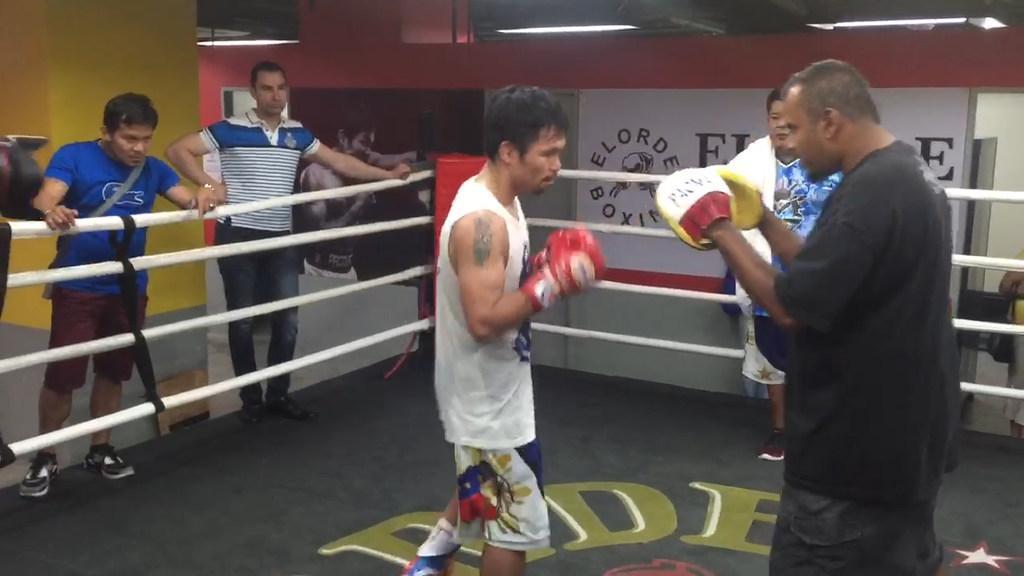
At 12, with his mother and five siblings now living in General Santos City, a metropolis of half a million people, Pacquiao left school to sell peanuts, donuts and cigarettes on street corners to help his family but he envisioned a different future in 1990 when he watched a boxing match on television between the monstrous Mike Tyson and the underdog James “Buster” Douglas.
As Douglas climbed from the canvas to drive Tyson to the floor with a series of huge blows Pacquiao recalled: “This was my first hope in life that I could be something or someone. I was the underdog, and maybe not even big enough to be a fighter. I wasn’t from anywhere in the world that mattered. I had nothing to lose.’’
Pacquiao became an amateur boxer at 13 and at only 40kg hit hard enough to break the ribs of other boys. By 15, and still sleeping at home on a mattress of cardboard, he was a local hero.
He yearned to make money to help his mother and at 16 he and a friend, Eugene Barutag, stowed away on a freighter bound for the boxing arenas of Manila 1600km to the north.
“When I was on the boat I was crying,’’ Pacquiao recalls. “I didn’t know if I would ever see my family again.’’
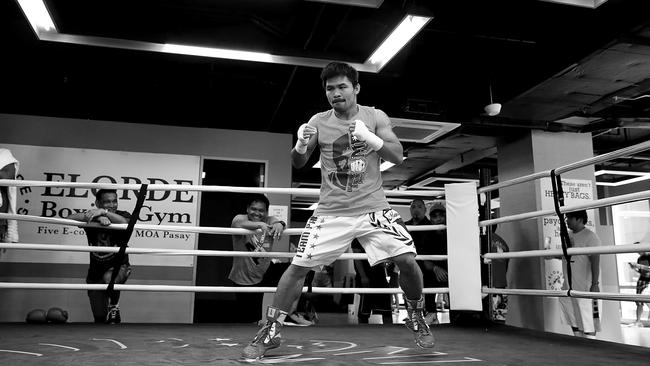
With its towering skyscrapers and endless traffic, Manila terrified him. The two boys slept in a park and Pacquiao made $5 a day when he could find work, first scraping off rust at a scrap metal yard, then toiling as a gardener, construction worker, waiter and tailor. He washed dishes so he could eat restaurant leftovers. He tells me even though Jeff Horn might be hungry for success the Brisbane boxer, who has a Bachelor of Education degree from Griffith University, has never known the hunger that he endured. Pacquiao began training in the first real boxing gym he had seen and even though it was up four flights of steep stairs in a dilapidated building in a Manila slum, Pacquiao felt at home with the threadbare equipment, dusty floors and the ever-present pong of body odour. The gym owner let him sleep in a tiny room little bigger than a cupboard.
In December 1995, he and Barutag appeared on the same fight card together, against different opponents, at a small Manila hall. Barutag was winning his fight but faded badly in the later rounds and took one heavy punch after another before collapsing in his corner, unconscious. Chaos ensued as officials tried to revive him.
Pacquiao’s eyes well with tears when he recalls how he held Barutag in his arms backstage. “He was my close friend. I feel so bad,’’ Pacquiao said. “I was saying to him ‘Come on, you can make it’ but his eyes looked straight ahead and he was not breathing anymore.’’ Pacquiao’s friend was dead at 16.
Incredibly, minutes after that numbing tragedy, the baby-faced Pacquiao, now weighing 50kg, climbed into the same ring to beat his opponent by a points decision. Pacquiao spent the next three days sitting by Barutag’s open coffin and he paid for the funeral from the little money he had saved.
The tragedy did not destroy Pacquiao; it made him stronger. Three years later, in Thailand, he won the World Boxing Council flyweight (51kg) title, the first of 11 world championships he has held.
Jeff Horn was seven when Pacquiao became a professional boxer. He had no interest in the sport until some kids at MacGregor High, in Brisbane’s south, started using him as a punching bag in his last year there.
In 2006, Horn enrolled in a self-defence class conducted by a multi-millionaire investor and martial arts expert named Glenn Rushton, who still teaches his students inside the home gym of his Stretton mansion in Brisbane’s south. Rushton, 59, as lean and tough as the many champions he now trains, remembers Horn arriving for lesson one and thinking the kid was “a bit of a nerd’’.
“But there was something about Jeff,’’ Rushton says. “He’d never done any boxing training at all and didn’t even know how to throw a punch but he was naturally quick and physically tough. Jeff was a pretty good soccer player and he had terrific footwork and he picked up what I was teaching him very quickly. He trained with me one day a week for about a-year-and-a-half and in 2008 told me he wanted to take up boxing seriously. I said ‘Jeff, give me four years and you’ll go to the Olympics’. And he did. (He made the quarter finals in London in 2012) Now I’ve told him he can beat Manny Pacquiao. And he will.’’
Pacquiao will knock out Jeff Horn any time he chooses.’’ That’s the opinion of Freddie Roach, 57, who runs the Wild Card Boxing gym in Los Angeles and who has been Pacquiao’s trainer since the Filipino made his American debut in 2001. Roach has a shock of grey hair and a neat beard, both of which were once red. Behind thick, black-rimmed glasses Roach’s darting eyes see weaknesses in everything Horn does. A former world class 60kg boxer himself, Roach has suffered the tremors of Parkinson’s disease for more than 30 years but as well as Pacquiao, he has coached some of the sport’s greatest including Mike Tyson, James Toney, Oscar De La Hoya and Bernard Hopkins.
“Manny hasn’t scored a knockout since 2009 and I think we’re due for one against Jeff Horn,’’ Roach says.
The first time Horn laid eyes on Pacquiao, the Filipino was beating up one of the biggest names in the sport on TV. It was December 6, 2008, and Horn had just started getting serious about boxing. In the biggest fight that year, the rank underdog Pacquiao overwhelmed De La Hoya, Olympic gold medallist and hero of American boxing. Pacquiao had been a world champ at lighter weights for a decade but no one outside his own stable knew he was that good. Pacquiao tormented De La Hoya for eight rounds.
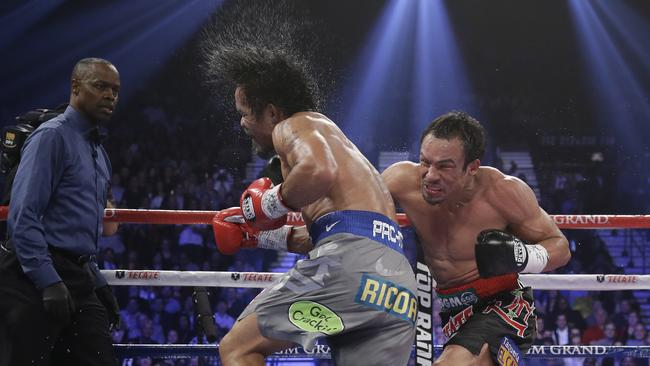
“He was like a fly buzzing around me and I couldn’t hit him,’’ De La Hoya later lamented. “He would throw punches and punches in bunches and he was landing everything. He was so relentless. His footwork is extraordinary.’’
Horn, then a boxing novice, remembers being “wowed’’ by the Filipino’s astonishing speed and power and still shakes his head that 11 years after being beaten up at high school he will now be facing that same fighter before the biggest crowd ever seen for an Australian boxing match.
Pacquiao’s win over De La Hoya catapulted him into the stratosphere of boxing earnings and he was soon collecting multimillion-dollar paydays and the scalps of other major stars Ricky Hatton, Miguel Cotto, Antonio Margarito and Shane Mosley. But Horn is quick to point out that Pacquiao isn’t always on the winning end.
The world champ has lost three of his last eight fights – including the points defeat to Mayweather in 2015 and Rushton is coaching Horn to emulate the performance of Mexican Juan Manuel Marquez, who won only one of his four fights with Pacquiao but won it in spectacular style. It was 2012 in Las Vegas and Marquez knocked Pacquiao unconscious with a booming right hand to the chin. “Jeff is bigger and younger than Marquez,’’ Rushton says. “He’s more unpredictable than Marquez, more dangerous.’’
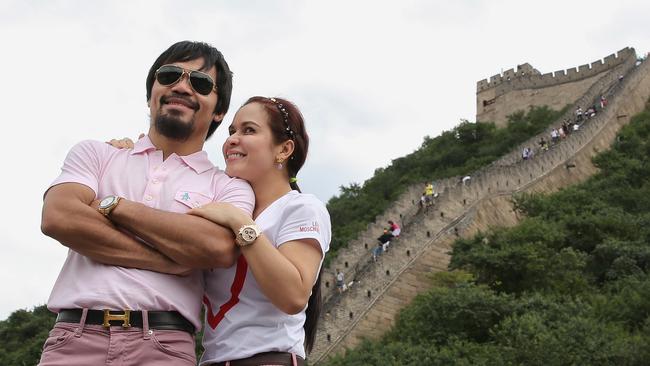
Pacquiao met his wife, Jinkee, in 1998 when she was working as a beauty consultant at the General Santos Mall. He was feeling on top of the world after having earned enough money to buy a second-hand Toyota Corolla but says he was so dumbfounded by Jinkee’s “loveliness’’ that he stood slack-jawed in front of her for what seemed an eternity of embarrassing silence. He finally found his voice to propose the next year and they married in 2000. They have five children, Manny Jr, 16, Michael, 15, Mary 11, Queen Elizabeth, 8, and Israel, 3. Each Sunday Pacquiao tweets photographs of his family at church.
On May 29 he posted a photograph with his wife and the caption: “My Love. My Life. My Bestfriend (sic). My Laughter. My Soul Mate. My One and Only’’.
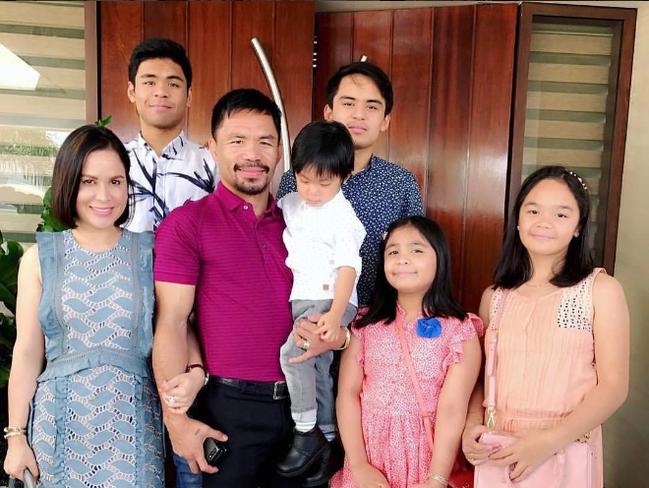
But it hasn’t always been a happy marriage. By his own admission Pacquiao was once an uncontrollable wild man. He was unfaithful many times and while he is now a member of the Philippines Government advocating the death penalty for drug dealers, he admits he has used cocaine, methamphetamine and marijuana. As a rich young sports idol he also ran a casino and owned a strip club employing 100 girls.
I suggest to Pacquiao that he also enjoyed a drink once. “Once?’’ he replies, rolling his eyes. “More than once. Much more. I used to be drinking every night.’’
One of Pacquiao’s closest friends is David Sisson, the 25-year-old son of American missionaries who have preached the gospel in General Santos City for more than two decades.
“Manny was a wild guy, really crazy,’’ the young Baptist says. “It’s amazing to see how he went from that lifestyle to what he has now as a devoted family man and a well-respected senator.’’
In 2011, just as Jinkee was planning to divorce him, Pacquiao had what he calls “a spiritual reawakening’’ and became a non-denominational Christian. He said he experienced dreams and visions and heard the voice of God “so powerful’’ that he felt he was trembling and melting. In the past six years, he says Jinkee has helped him become not just a better fighter but a better man.
The couple took a second honeymoon in May 2012 and were arm in arm cuddling the koalas at Brisbane’s Lone Pine on their visit to Australia in April.
“Manny at his best will destroy Jeff Horn,’’ says Freddie Roach. But Horn retorts that Pacquiao is no longer “at his best’’. “He’s one of the greatest boxers of all time but he’s slipped maybe 30 per cent from his best,’’ Horn says after a training session last week watched by a large crowd including his wife, Joanna, his high-school sweetheart who well remembers the days when he was getting beaten up.
“Manny is 38 now and I’m 29. I feel this is my time; that I’m on the way up and he’s on the way down. Every fight I’ve been getting better and I know with the huge crowd behind me at Suncorp I can lift to another level again and take Manny’s title.’’
Five months ago, Horn thought I was kidding when I rang him to say there was a definite chance he could be fighting Pacquiao at Suncorp Stadium and that a deal was in the works. Horn’s promoter Dean Lonergan, a former representative player for the New Zealand rugby league team, had been toying with the idea since last year.
Horn had never drawn more than 1800 people for a fight in Brisbane and the thought of him somehow drawing what potentially could be a bigger crowd than the State of Origin match at Suncorp last month seemed absurd. But the fight has proved to be a big hit, the audience drawn by the story of the mild-mannered victim of bullies standing up for himself against one of the great figures in boxing history.
Rushton says despite Pacquiao’s formidable reputation and almost 20 years as a world champ, Horn is in the box seat. “Manny only has two fists, the same as Jeff. He can’t hit Jeff with his reputation, he can’t hit Jeff with his experience. When the bell goes it gets down to how much Jeff wants this and we both believe Jeff can shock the boxing world.’’
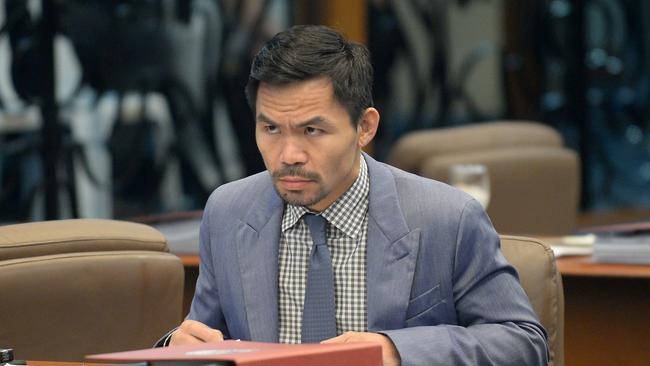
Twenty-two years after Eugene Barutag’s death I am in the Philippines Senate, watching Pacquiao pushing through a Bill to establish a Philippines Boxing Commission. A sign at the front of the Senate chamber lists restrictions in the building that include “carrying of firearms and deadly weapons, wearing shorts or slippers, drinking, eating, smoking or sleeping’’.
There’s none of that going on, though. Pacquiao, dressed in a sharp suit and silk tie, commands respect just as he has done in the 67 times he has fought professionally. He tells the Senate he wants stronger regulations in the sport to make it safer and is calling for more stringent medical checks. More than most fighters, he knows boxing is a dangerous game.
The next morning at his $20 million house on Cambridge Circle in the exclusive Forbes Park area of Manila, I ask Pacquiao how he reconciles being a devout Christian with deliberately causing physical harm to another human being. He’s in the middle of an exercise routine that includes 2000 sit-ups and for a moment it seems that he can’t stomach my question. Finally he replies: “Boxing is a sport, but a tough sport and people get injured like other sports. I have known boxers who have been injured and even my friend died. But it is my sport and my job and my passion.
“It is nothing personal against Jeff Horn. I want to win in Brisbane. I want to put on a good fight for the fans and show them I am still the best in the world. I want people to believe that no matter where you come from if you work for it you can be anything in this life.’’ ■
The fight will be broadcast on Foxtel Main Event from 11am on July 2. foxtel.com.au


Add your comment to this story
To join the conversation, please log in. Don't have an account? Register
Join the conversation, you are commenting as Logout
Ben Fordham spreads huge UFC rumour
UFC boss Dana White is travelling to Sydney and there is speculation Donald Trump’s confidante will make a big announcement.
Revealed: Tszyu’s back after sealing blockbuster American fight
It’s official: Tim Tszyu is returning to the ring. And the ‘Soul Taker’ is risking his career, declaring he wants no easy fights after rejecting Michael Zerafa and agreeing terms to face a rising American star.